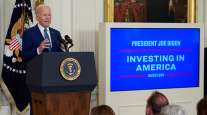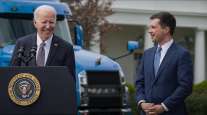States Seek New Funding for Infrastructure Upgrades
This story appears in the Feb. 18 print edition of Transport Topics.
With federal highway funds dwindling, some states are proposing unprecedented fuel-tax increases, while others are considering legalized gaming and boosting sales taxes to pay for roads and bridge fixes.
“There’s no cavalry coming,” said Donald Boyd, senior fellow at the Rockefeller Institute of Government. “The feds have done what they’re going to do. There’s no reason to expect more money is coming.”
Michigan could see the largest percentage increase in the fuel tax, if Gov. Rick Snyder’s (R) plan gains approval. On Feb. 7, he proposed raising the diesel tax to 33 cents from 15 cents. He also wants the gas tax at 33 cents, up from the current 19 cents.
Snyder also wants indexing of the taxes beginning in 2016 and a 25% increase in vehicle registration fees.
“We have thousands of bridges that are deficient that need to be upgraded,” said Walt Heinritzi, executive director of the Michigan Trucking Association.
While MTA supports efforts to invest in the infrastructure, it has not yet taken a position on Snyder’s proposal, in part because of the cost to truckers. On top of higher fuel taxes, the increase in registration fees would push the cost for a truck to $2,075 annually from $1,660, Heinritzi said. Some Michigan lawmakers are advancing a competing proposal to end fuel taxes and add 2 cents to the state’s 6-cent sales tax.
Michigan’s not the only state attempting new ways to replace the fuel tax.
In Pennsylvania, Republican Gov. Tom Corbett has proposed raising the state’s per-gallon oil company franchise tax by about 28.5 cents per gallon over five years, ending its $1.25 ceiling. But critics said that if wholesalers pass all of the 28.5-cent tax on to consumers, in five years the effective diesel tax would be 64.6 cents a gallon.
Corbett also proposed cutting by 2 cents a gallon over the next two years the 32.3-cent gasoline tax and the 38.1-cent diesel tax.
In Wyoming, where a reported $135 million is needed for roads this year, truckers are backing higher taxes but not tolls. They’re behind a bill passed by the House and Senate that would add 10 cents to the state’s 14-cent diesel and gasoline tax. The bill awaits the governor’s signature.
“Unfortunately, this increase will fall short of raising all of the revenue [the Wyoming Department of Transportation] says it needs on an annual basis to maintain the current highway system,” said Sheila Foertsch, managing director of the Wyoming Trucking Association.
She said WTA has already helped defeat two other proposals this year: for tolls on Interstate 80 and a mileage tax on trucks.
Transportation funding plans are surfacing and dying so quickly in the states this year that the National Conference of State Legislatures is struggling to keep track, said James Reed, who directs NCSL’s transportation program. “There’s a lot of plans out there, a lot of ideas,” Reed said. “I think it’s been simmering for a few years because there simply isn’t enough funding.”
In Maryland, a funding plan has been introduced to tax wholesale fuel sales.
“It also lets the counties impose their own fuel taxes of up to 5 cents,” said Louis Campion, president of the Maryland Motor Truck Association. “If [a county doesn’t] do it, then, the state would impose that 5 cents and reap the money.”
Meanwhile, in Missouri, lawmakers are proposing to freeze the state’s 17-cent fuel tax and ban tolling in exchange for adding a 1-cent transportation tax to the state’s 4.225-cent sales tax.
For other states, including Connecticut, opting to leave fuel taxes alone and institute tolls is a possibility. But trucking leaders are quick to oppose, calling those choices harmful to the industry.
“This state doesn’t want tolls,” said Mike Riley, president of the Motor Transport Association of Connecticut. “And we’ll fight it and many other people will fight it.”
Some states are moving beyond the roadways for funding to untraditional options. New Hampshire truckers are supporting state Senate efforts to legalize gaming and dedicate some of the revenue to transportation needs, said Robert Sculley, president of the New Hampshire Motor Transport Association.
One proposal would give transportation about 48% of video gaming receipts the state would collect.
But Sculley said truckers oppose a bill drafted by the state’s transportation department to raise the 18-cent diesel and gasoline tax by 12 cents over three to six years. The bill would also increase the registration fee on an 80,000-pound truck by $25 annually for three years.
The measure would cost a New Hampshire trucker $2,000 annually in new taxes and fees, Sculley said.
“Right now, we raise $146 million a year and this bill would raise $147 million more a year,” Sculley said. “We think that is just outrageous.”
In Wisconsin, a transportation commission recommended adding 5 cents to the 32.9-cent gasoline and diesel tax and increasing truck registration and weight fees by 73%.
That would put fees for an 80,000 pound truck at $4,455 annually, said Tom Howells, president of the Wisconsin Motor Carriers Association.
WMCA opposes both ideas. Gov. Scott Walker is to propose his own plan on Feb. 20.




